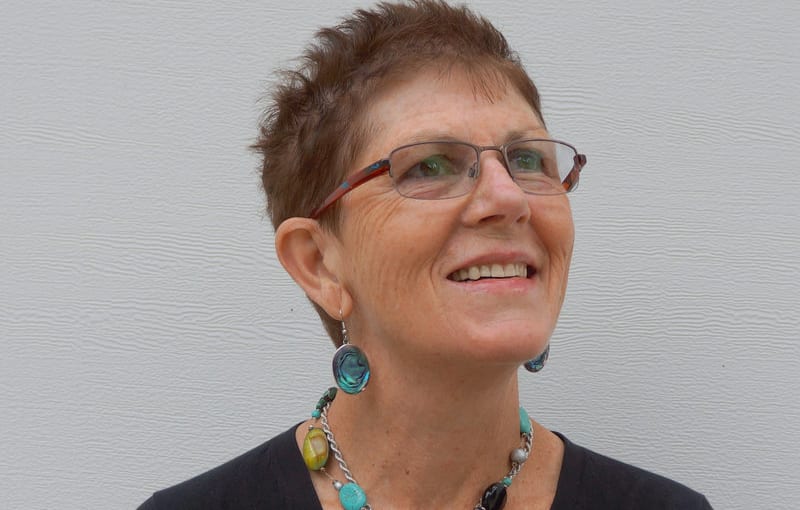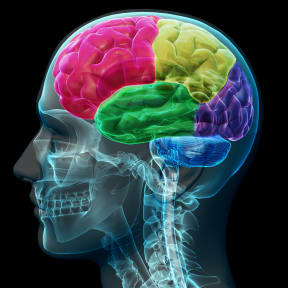When tumours took hold of Barbara Lispka's brain and she lost her grip on reality, the American neuroscientist had a powerful opportunity to examine mental illness from the inside.

Photo: Supplied
Three years ago Lipska was working at her computer when she lost sight of her right hand.
“I sat down at the computer, looked at my keyboard and didn’t see my hand. It disappeared. It was terrifying. I have no words for the feeling that I had.”
Lipska, now in her early 60s, had survived breast cancer in 2009 and melanoma three years later.
After four decades studying the human brain, she knew her disappearing hand most likely indicated she had a tumour.
“But I expelled this thought the same moment it came in – it was too terrifying and too deadly.”
An MRI scan confirmed she had a metastatic brain tumour in the area that governs vision.
The melanoma that had developed on her neck three years earlier had spread to her brain.
“I had three tumours in the brain – one was bleeding and it was in the visual cortex.”
Diagnosed with multiple tumours, Lipska, though certain she would die, agreed to undergo the relatively new new immunotherapy treatment.
“I was, in a way, an experimental rat on which this immunotherapy for the brain was tried.”
There were physical side effects, which she’d been expecting. “What I was not expecting at all were the behavioural changes.”
For two months, Lipska's family watched her slipping into someone they didn’t know.
"I became a monster. I became another person than they knew"
Her growing irritability was at first put down to understandable stress, but gradually she became angry at everybody, showed no other emotion or empathy, and began acting strangely.
One day, she went out running with hair dye dripping down her face and neck – and didn’t notice.
“I had absolutely no insight into my strange behaviours.
"I didn’t know that I was misbehaving, I didn’t know that I was yelling.”
Lipska began to think people around her were trying to poison her.
After she became convinced a takeaway pizza was stuffed with plastic – “I actually saw plastic in it” – her daughter had her contact her doctor about the mental symptoms.

Mental disorders can result from changes in the brain we don't yet understand, Lipska says. Photo: 123RF
Her experience has given her an insight into what can happen to people with mental disorders.
“They don’t have tumours, of course, but they have some structural or functional changes in the brain that we don’t fully understand yet.”
Liska’s brain had swollen hugely so the frontal cortex – responsible for social behaviour and empathy – wasn’t working properly.
She says she wasn’t in denial or refusing to listen to people, she simply did not hear or understand them.
“It was as if I was living inside my brain with the outer world scheming and plotting against me.”
Liska says the experience has taught her diseases of the brain are just like any other physical illness except they affect a complicated part of the body that we don't understand.
People who become mentally ill shouldn’t be ostracised or blamed for not making sense or hurting loved ones, she says.
“I hope to remove some of the stigma of mental illness by demystifying this illness."
Liska’s response to the immunotherapy treatment was extremely strong, resulting in huge inflammation and swelling in the brain.
At the peak of her “craziness”, she was given steroids to reduce the swelling, radiation to kill the tumours and targeted therapy that affected the melanoma cells.
She says she doesn’t know which helped, but started feeling better within a relatively short time. “I started regaining my sanity”.
As a professional, Liska now believes it's a matter of urgency that better medications be developed for conditions of the mind such as schizophrenia and dementia.
Still the director of the Human Brain Collection Core (HBCC) at the National Institute of Health in Maryland, which fosters research on brain and behaviour, she has written an account of her experiences: The Neuroscientist Who Lost Her Mind: A Memoir of Madness and Recovery.
Right now she's training for a half ironman triathlon which she plans to complete with her family in June.
“We cannot put away things for later, because we never know what will happen.
“So I draw satisfaction from every day of my life now. I work, I write, I do a lot of sports still.
"I visited the doctor yesterday. It’s never 100 percent okay… I just have to get used to it. When I have to make a decision I will. For now, it’s okay. I’m preparing for the races.”

